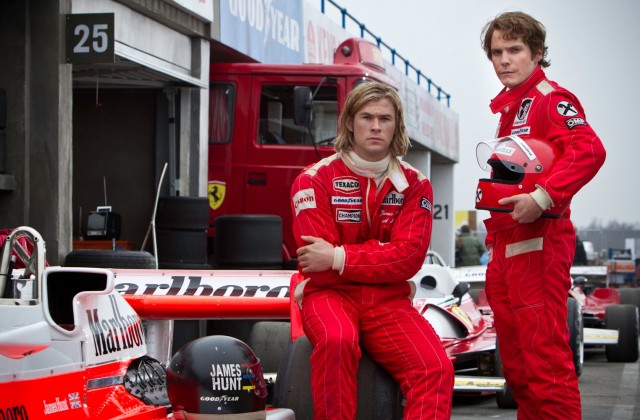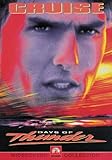Rush is pure adrenaline … 70’s style

Ron Howard’s latest ‘Rush’ covers one of Formula One racing’s greatest stories: the rivalry between James Hunt and Niki Lauda.
To me, Days of Thunder has always been the quintessential “racing” movie (don’t talk to me about Talladega Nights; it doesn’t even pass Stroker Ace for second place). While the Tom Cruise/Tony Scott NASCAR send up did a solid job introducing the mindset of the drivers that – to steal a line from a different Cruise/Scott project – “feel the need for speed.” But where Thunder was an introduction, Ron Howard’s Rush might be a master’s class, exploring the driver’s motivations and doing nearly everything right along the way (save for the selection of the “wrong” version of Steve Winwood’s “Gimmie Some Lovin’” – Thunder got that right).
Rush reintroduces the world to Formula One stars James Hunt and Niki Lauda, in the forms of Chris Hemsworth and Daniel Brühl. The pair had an interesting rivalry that defined racing in the 70s. Rush explores their relationship from its origins, how one’s growth affected the other’s. Olivia Wilde appears as Hunt’s wife Suzy Miller and Alexandra Maria Lara as Lauda’s wife Marlene. The rest of the cast is filled out with a few familiar faces, primary of which – at least for this reviewer – is Game of Thrones and Elementary’s Natalie Dormer as an early fling of Hunt’s (I’m a bit of a fan).
Considering the way the film has been marketed, taking advantage of Hemsworth’s extreme popularity, one might expect the focus to be on James Hunt. The story actually does a pretty good job of portraying both he and Lauda equally. But it’s somewhere around the halfway mark that you realize despite the narrative’s balance, it is really Lauda’s movie. Brühl delivers a sneaky-good performance, creating a character that is off-putting in the beginning, but eventually steals the audience’s heart.
From a technical perspective, Rush is outstanding. Howard uses a color-balancing technique that gives the film a distinctly “70’s” feel while remaining 2010’s high-def. Hans Zimmer’s soundtrack is a perfect fit (even if the signature riff is a little too reminiscent of Ramin Djawadi’s work on Game of Thrones this season), accentuating the flick’s loud, fast moments as well as those slower moments off the track.
I’m surprised by the film’s early fall release. Considering the dearth of quality flicks this summer, I think Rush would have made a metric-crap-ton of dough had it taken on the summer’s “titans.” Instead, Rush will quietly become one of 2013’s best films without the attention that a summer date would have provided.
 CliqueClack
CliqueClack


